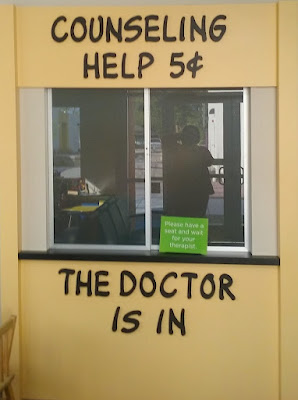Years ago, when talking with my daughter's therapist, as I tried to be there for both my kids while supporting the family with a F/T job as my family and home broke painfully apart and crashed, I was given the best piece of advice.
"Your daughter needs to see you happy," she said. "She needs to see you making time with your friends and modeling positive social and coping strategies."
At the time I felt despair, like falling down a well. I was overwhelmed, unequipped, and isolated. I felt like the worst parent ever.
Then I tried even harder to catch myself first before hyper focusing on "finding a fix" for my kids.
I have gotten better with practice. I have realized this not only applies to my daughter, it also applies to James, who has a highly developed empathy with those around him. On the plus side, he models "good" behaviours if they are around him and he can, to an extent, read a room. On the stinker side, it gives him a fiendish ability to push peoples' buttons.
But I digress. Fewer years ago, I was talking frankly with my son's ABA supervisor, about the overall regressions and socially unacceptable behaviours that roared out in the face of a horrible 8th grade experience, second evacuation due to wildfires, and COVID-19 lock down. I was so desperate for help that despite trying to bubble myself so I could remain on call for my family members with already compromised immune systems and not lose any time at a severely unsympathetic job - I called ABA and told them I wanted to continue in-home services. Thankfully, it was the right call.
"Your son is begging you for attention," he said to me. "You do not realize how stressed you are and how that is affecting him. I know you have a huge load of responsibility, but your son NEEDS you." This set me on the track of thinking again about the Parental Mirror, as I like to think of it, and how important that was for my kids and myself.
With this supervisor's urging, I was able to investigate IHSS and becoming my son's caregiver. A family friend, who also is an IHSS caregiver for her disabled son, urged me on further. I discovered that an IHSS staff person had misled me in thinking I could not be my son's paid caregiver (at 15 hours a week) if I also worked full-time. To make a long story short, I transitioned from working 40 hours a week at an increasingly stressful job and not being paid for caring for my son to being paid to care for my son (currently at 63 hours a week) and (all things considered) earning more take-home pay.
I am SO much happier, and it shows in my son's reports from school and his overall demeanor. It has taken me a full year to stop feeling burned out and that I can do more besides caregiving for my son and start living my life again.
Everyone will tell you that, as a Special Needs Parent, you are crucial to your child's development and well-being. Next time you're feeling stressed and downhearted, take a look at yourself in the Parental Mirror, and give yourself a boost, love, and encouragement - just as you would to your kids. It works, and you're worth it.






